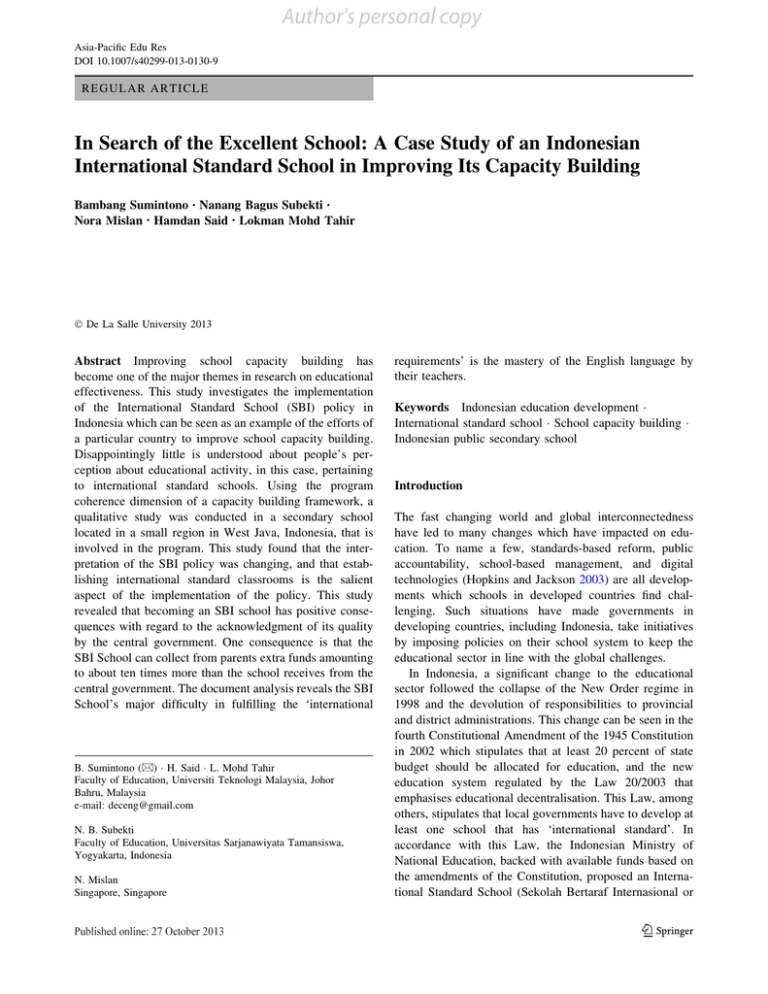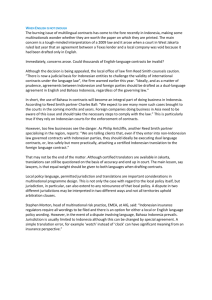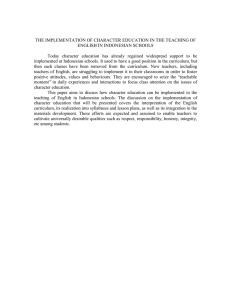Author's personal copy
advertisement

Author's personal copy Asia-Pacific Edu Res DOI 10.1007/s40299-013-0130-9 REGULAR ARTICLE In Search of the Excellent School: A Case Study of an Indonesian International Standard School in Improving Its Capacity Building Bambang Sumintono • Nanang Bagus Subekti • Nora Mislan • Hamdan Said • Lokman Mohd Tahir Ó De La Salle University 2013 Abstract Improving school capacity building has become one of the major themes in research on educational effectiveness. This study investigates the implementation of the International Standard School (SBI) policy in Indonesia which can be seen as an example of the efforts of a particular country to improve school capacity building. Disappointingly little is understood about people’s perception about educational activity, in this case, pertaining to international standard schools. Using the program coherence dimension of a capacity building framework, a qualitative study was conducted in a secondary school located in a small region in West Java, Indonesia, that is involved in the program. This study found that the interpretation of the SBI policy was changing, and that establishing international standard classrooms is the salient aspect of the implementation of the policy. This study revealed that becoming an SBI school has positive consequences with regard to the acknowledgment of its quality by the central government. One consequence is that the SBI School can collect from parents extra funds amounting to about ten times more than the school receives from the central government. The document analysis reveals the SBI School’s major difficulty in fulfilling the ‘international B. Sumintono (&) H. Said L. Mohd Tahir Faculty of Education, Universiti Teknologi Malaysia, Johor Bahru, Malaysia e-mail: deceng@gmail.com N. B. Subekti Faculty of Education, Universitas Sarjanawiyata Tamansiswa, Yogyakarta, Indonesia N. Mislan Singapore, Singapore requirements’ is the mastery of the English language by their teachers. Keywords Indonesian education development International standard school School capacity building Indonesian public secondary school Introduction The fast changing world and global interconnectedness have led to many changes which have impacted on education. To name a few, standards-based reform, public accountability, school-based management, and digital technologies (Hopkins and Jackson 2003) are all developments which schools in developed countries find challenging. Such situations have made governments in developing countries, including Indonesia, take initiatives by imposing policies on their school system to keep the educational sector in line with the global challenges. In Indonesia, a significant change to the educational sector followed the collapse of the New Order regime in 1998 and the devolution of responsibilities to provincial and district administrations. This change can be seen in the fourth Constitutional Amendment of the 1945 Constitution in 2002 which stipulates that at least 20 percent of state budget should be allocated for education, and the new education system regulated by the Law 20/2003 that emphasises educational decentralisation. This Law, among others, stipulates that local governments have to develop at least one school that has ‘international standard’. In accordance with this Law, the Indonesian Ministry of National Education, backed with available funds based on the amendments of the Constitution, proposed an International Standard School (Sekolah Bertaraf Internasional or 123




